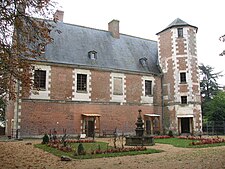
Back Примирие в Тур Bulgarian Trêve de Tours French Tregua di Tours Italian トゥール条約 Japanese Verdrag van Tours Dutch Турское перемирие Russian 圖爾條約 Chinese
| Treaty of Tours | |
|---|---|
 The Château de Plessis-lez-Tours, where the treaty was signed | |
| Type | Truce and marriage agreement |
| Context | Hundred Years' War |
| Signed | 28 May 1444[1] Château de Plessis-lez-Tours[citation needed] |
| Expiry | 31 July 1449 |
| Parties | |
| Negotiators | For England: William de la Pole For France: Jean de Dunois Louis de Beaumont[citation needed] |
The Treaty of Tours was an attempted peace agreement between Henry VI of England and Charles VII of France, concluded by their envoys on 28 May 1444 in the closing years of the Hundred Years' War. The terms stipulated the marriage of Charles VII's niece, Margaret of Anjou, to Henry VI, and the creation of a truce of two years – later extended – between the kingdoms of England and France. In exchange for the marriage, Charles wanted the English-held area of Maine in northern France, just south of Normandy.
Henry VI married the fifteen-year-old Margaret in April 1445; he did not, however, give up Maine immediately. This clause was initially kept secret, as the cession of this strategically important province was likely to cause a public backlash in England. Charles threatened Henry VI and sent envoys to pressure him; even Margaret tried to persuade Henry to give it up. Henry eventually yielded in 1448 when Charles VII threatened English garrisons with a large army.
The treaty was seen as a major failure for England as the bride secured for Henry VI was a poor match, being Charles VII's niece only through marriage, and was otherwise related to him by blood only distantly. Her marriage also came without a dowry, as Margaret was the daughter of the impoverished Duke René of Anjou, and Henry was also expected to pay for the wedding. Henry believed the treaty was a first step towards a lasting peace, while Charles intended to use it purely for military advantage. The truce collapsed in 1449 and England quickly lost what remained of its French lands, bringing the Hundred Years' War to an end.
The failure of the treaty of Tours and the renewal of hostilities brought down the English government of the day. Its consequences exacerbated rifts between the court's Beaufort faction and the dukes of Gloucester and York, and has been considered a potentially contributory factor to the outbreak of the Wars of the Roses.
- ^ The truce was agreed on 20 May, the marriage on 22, the betrothal was formalised on 24, and the final treaty was signed on 28 May.
© MMXXIII Rich X Search. We shall prevail. All rights reserved. Rich X Search